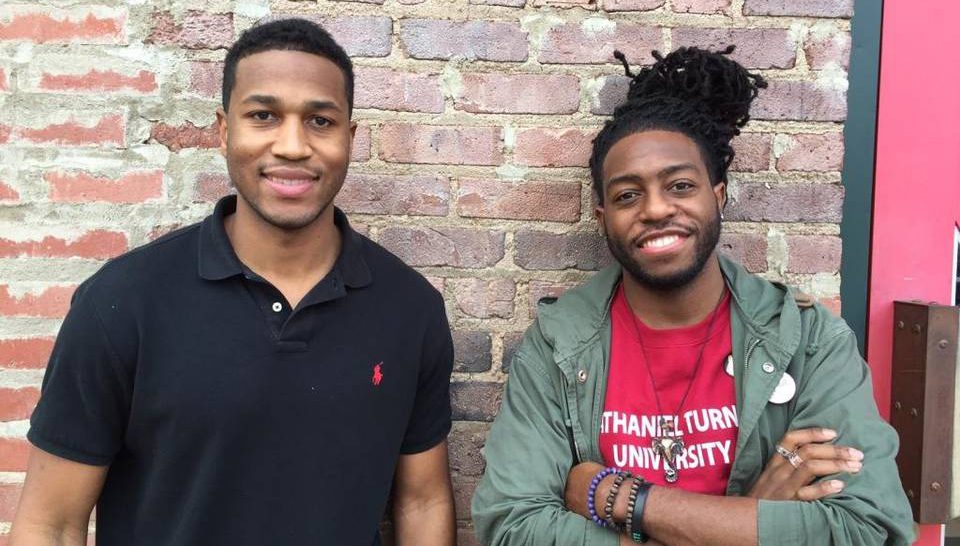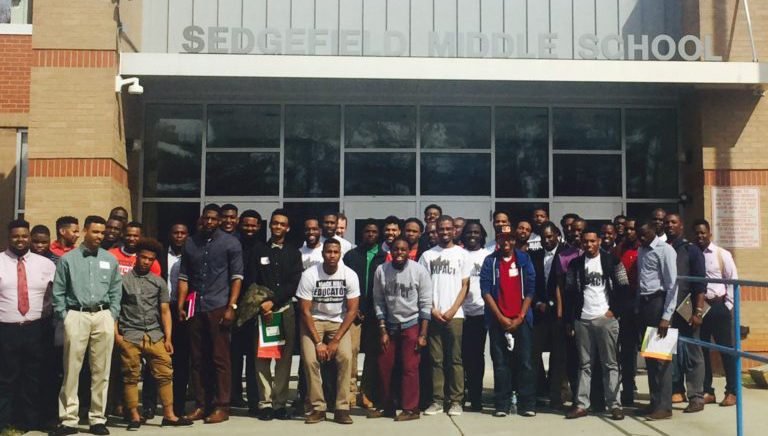The class project

When Jason Terrell ’12 began teaching English at James Martin middle school in Charlotte a few years ago he noticed something both interesting and disturbing—the diversity of the student body did not reflect the diversity of the teachers. Truth be told, there was not much diversity among the teaching population. For some of Terrell’s students he was the first black male educator they had ever seen, not to mention their first positive, black male role model. But he wasn’t really all that surprised. What his students were experiencing in Charlotte was very similar to Terrell’s experience as young student in Atlanta.
“I wasn’t the best in middle school or high school,” he says. “I really didn’t have any role models in school so I didn’t care, it just wasn’t very important to me.” Despite being pushed by his parents and grandparents to “always do his best” and “keep striving to improve” Terrell didn’t find that same type of support in the classroom. “The teachers cared, but they seemed more focused on keeping order than really investing in the students growth,” he says. “If I had someone at school reinforcing what my parents were telling me at home it would have helped me tremendously.”
But Terrell is an intelligent guy, and through some hard work and self-motivation he entered Furman in 2008 with plans to study political science and eventually attend law school. During his junior year he met Glen Halva-Neubauer, Dana Professor of Political Science and director of Furman’s Mock Trial and Public Service Internship programs. “He became my mentor,” Terrell says. “He asked me about my interests, got me involved with mock trial, and told me about all the things Furman could offer me. He really took the time to coach me.”
As a member of the NAACP at Furman, Terrell worked with the Urban League of Greenville which led to an internship with the Urban League of Atlanta in his hometown the summer before his senior year. During that summer Terrell worked alongside other Urban League interns and staff, helping local inner city high school students. “It was basically a college prep class, and I was an assistant director and teacher,” he says. “Some days we took students to visit colleges and universities, and it was amazing to watch them walk around these institutions and began to think that they might actually belong there. That summer changed my whole trajectory.”
Terrell returned to Furman in the fall as a man at a crossroads. For years being an attorney had been his sole focus, but now he was beginning to imagine the impact he could have as a teacher, a mentor, and a positive black male role model to students who felt isolated and disadvantaged. It was a tough decision to make, and the choice became significantly more difficult when he was offered a full ride to law school on a diversity scholarship. “On the last day to accept it, I declined,” Terrell says. “My family was definitely shocked by that because I was so focused on being an attorney. But I had made the decision to go teach.”
After graduating Furman in 2012 Terrell joined Teach for America where he found himself in that middle school in north Charlotte thinking about the lack of diversity among the teaching staff. He started doing some research and discovered a troubling statistic: Only two percent of all of the teachers in the nation are men of color. “Students don’t have very many opportunities to see men of color in the school building,” he says. “So the idea of being a teacher isn’t a reality for a lot of boys, and that’s just because there is a lack of representation.” Terrell also quickly discovered that as a black male teacher he was expected to take on additional duties, what the former U.S. Secretary of Education John King Jr., labeled as “the invisible tax on teachers of color.” “Because you have a unique story and a unique identity schools look to you to handle a lot of responsibilities that you are probably not ready to handle, like discipline issues,” he says. “Just having somebody to help navigate that is important. I was fortunate enough to have a male at my school named Mr. Brooks. He was a thirteen-year veteran, and he took me under his wing and became my mentor. I would go into his room and just vent. But a lot of teachers don’t have that support.”

HeartWork School Partners like Sedgefield Middle School in Charlotte, N.C., provide opportunities for Gentlemen to network.
At the same time Terrell’s friend Mario Jovan Shaw, another Teach for America teacher in Charlotte, was having a similar experience of isolation. So the two young men began hosting small house gatherings in Charlotte where teachers who were men of color could tell their stories and offer each other support. These were the humble beginnings of Profound Gentlemen.
“Initially it was just come over, hang out, and let’s talk about what’s going on in the schools and in the classrooms because it’s very easy to feel isolated,” Terrell says. “Those gatherings quickly grew from eight teachers to ten to twenty to thirty. We knew we had something and wondered how we could take it and replicate it in other cities.” As the momentum of Profound Gentlemen picked up speed other organizations began to take note, and in 2015 Terrell and Shaw were awarded the Echoing Green fellowship, the same fellowship that funded Teach for America and AmeriCorps. “They fund you for two years,” Terrell says. “So this allowed us to quit our teaching jobs and focus full time on growing Profound Gentlemen.”
Today Profound Gentlemen has 125 members as well as part time staff in four cities: Chicago, Atlanta, Charlotte, and Memphis. “These teachers are leading bi-monthly professional development sessions for other teachers and building a really great community atmosphere,” Terrell says. “And now we want to increase our membership and the number of cities we serve. We’re currently looking at New York, Philadelphia and some smaller communities as well.”
The goal of Profound Gentlemen goes beyond just supporting and mentoring male teachers of color to also inspiring boys of color to reach their potential, both socially and academically, and see teaching as a career in which they can thrive. “Men of color don’t go into the profession because they fear they will be isolated,” he says. “That isolation is one of the biggest things we are trying to combat, and our way of doing that is using current teachers. Because who better to tell the story of teachers than teachers themselves.”
Terrell will tell you that declining that full ride to law school was one of the best decisions of his life. His desire to “make a positive impact” is now a daily reality as the retention rate for teachers in the Profound Gentlemen program is 95%, compared to 55% of men of color who are not in the program. So far Profound Gentlemen has directly impacted over 500 teachers, and in the fall of last year Terrell and Shaw were named to Forbes 30 Under 30 list of Social Entrepreneurs. “It’s all been amazing,” Jason says. “Looking back Dr. Halva-Neubauer and also Dr. Sneed in the Education Department are the professors at Furman who pushed me to pursue my passion for teaching, rather than law. I’m really glad they did.”